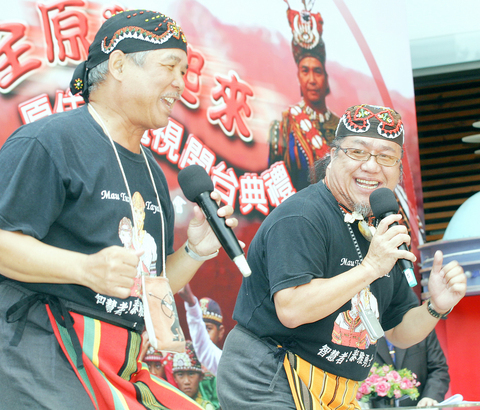The launch in Taiwan of Asia's first Aboriginal Television channel cements Aboriginal access to the media and advances the rights of Taiwan's indigenous people, President Chen Shui-bian (
Addressing the launch ceremony of the Indigenous Television Network (ITV), Chen said he had high hopes that the station would communicate the diversity of Taiwan's 12 Aboriginal tribes to the public and pass down the nation's indigenous cultural heritage to young Aborigines.
"Now that the camera and the microphone have been handed to the indigenous peoples, we expect ITV to seize this opportunity to disseminate minority viewpoints and their distinctive cultures and languages," Chen said.

PHOTO: TAI TA-HSIANG, TAIPEI TIMES
Thanks to five years of effort by the government, the media industry and Aboriginal-rights advocates, the launch of ITV yesterday followed a six-month trial broadcast that started last December.
Performances of traditional song and dance by renowned Aboriginal artists featured throughout the launch, which was held in front of the Taiwan Television Station (TTV), the parent network responsible for operation of the channel.
After delivering his speech, Chen pressed a button with Premier Frank Hsieh (謝長廷), Council of Indigenous Peoples (CIP) Chairman Walis Pelin and Government Information Office (GIO) Minister Pasuya Yao (姚文智) to symbolize the start of the TV station's operations.
ITV promises to present programs showcasing Aboriginal culture and which move beyond stereotyped images portrayed in the media to date.
Taiwan's 460,000 indigenous people are expected to have access to ITV via satellite and other receivers, even in remote mountainous and coastal areas, according to GIO officials.
Some Aboriginal advocates, however, continued to express concerns over poor reception in some communities and an excessive number of commercials.
They criticized TTV's use of commercials on the Hakka television channel, which has been operated by TTV since July 2003, and said they feared ITV would receive the same treatment.
"For example, the program hosts often refer to Aborigines as `they,' as if we were some foreign creature from another world," said Voyu (
Sylvia Feng (
In addition to representing Aboriginal groups, Feng said, this would help train new talent and further reduce unemployment in the Aboriginal population.
The Aboriginal Education Law (
However, the plan stalled in 2003 over concerns in the Legislative Yuan that a large number of Aborigines would not be able to receive the channel because of the poor reception in mountainous areas.
The legislature eventually passed the NT$300 million (US$9.5 million) budget last year.

Intelligence agents have recorded 510,000 instances of “controversial information” being spread online by the Chinese Communist Party (CCP) so far this year, the National Security Bureau (NSB) said in a report yesterday, as it warned of artificial intelligence (AI) being employed to generate destabilizing misinformation. The bureau submitted a written report to the Legislative Yuan in preparation for National Security Bureau Director-General Tsai Ming-yen’s (蔡明彥) appearance before the Foreign Affairs and National Defense Committee today. The CCP has been using cognitive warfare to divide Taiwanese society by commenting on controversial issues such as Taiwan Semiconductor Manufacturing Co’s (TSMC, 台積電) investments in the

INVESTIGATION: The case is the latest instance of a DPP figure being implicated in an espionage network accused of allegedly leaking information to Chinese intelligence Democratic Progressive Party (DPP) member Ho Jen-chieh (何仁傑) was detained and held incommunicado yesterday on suspicion of spying for China during his tenure as assistant to then-minister of foreign affairs Joseph Wu (吳釗燮). The Taipei District Prosecutors’ Office said Ho was implicated during its investigation into alleged spying activities by former Presidential Office consultant Wu Shang-yu (吳尚雨). Prosecutors said there is reason to believe Ho breached the National Security Act (國家安全法) by leaking classified Ministry of Foreign Affairs information to Chinese intelligence. Following interrogation, prosecutors petitioned the Taipei District Court to detain Ho, citing concerns over potential collusion or tampering of evidence. The

‘COMPREHENSIVE PLAN’: Lin Chia-lung said that the government was ready to talk about a variety of issues, including investment in and purchases from the US The National Stabilization Fund (NSF) yesterday announced that it would step in to staunch stock market losses for the ninth time in the nation’s history. An NSF board meeting, originally scheduled for Monday next week, was moved to yesterday after stocks plummeted in the wake of US President Donald Trump’s announcement of 32 percent tariffs on Taiwan on Wednesday last week. Board members voted to support the stock market with the NT$500 billion (US$15.15 billion) fund, with injections of funds to begin as soon as today. The NSF in 2000 injected NT$120 billion to stabilize stocks, the most ever. The lowest amount it

NEGOTIATIONS: Taiwan has good relations with Washington and the outlook for the negotiations looks promising, Minister of Economic Affairs J.W. Kuo said Taiwan’s GDP growth this year is expected to decrease by 0.43 to 1.61 percentage points due to the effects of US tariffs, National Development Council (NDC) Minister Paul Liu (劉鏡清) said at a meeting of the legislature’s Economics Committee in Taipei yesterday, citing a preliminary estimate by a private research institution. Taiwan’s economy would be significantly affected by the 32 percent “reciprocal” tariffs slapped by the US, which took effect yesterday, Liu said, adding that GDP growth could fall below 3 percent and potentially even dip below 2 percent to 1.53 percent this year. The council has commissioned another institution